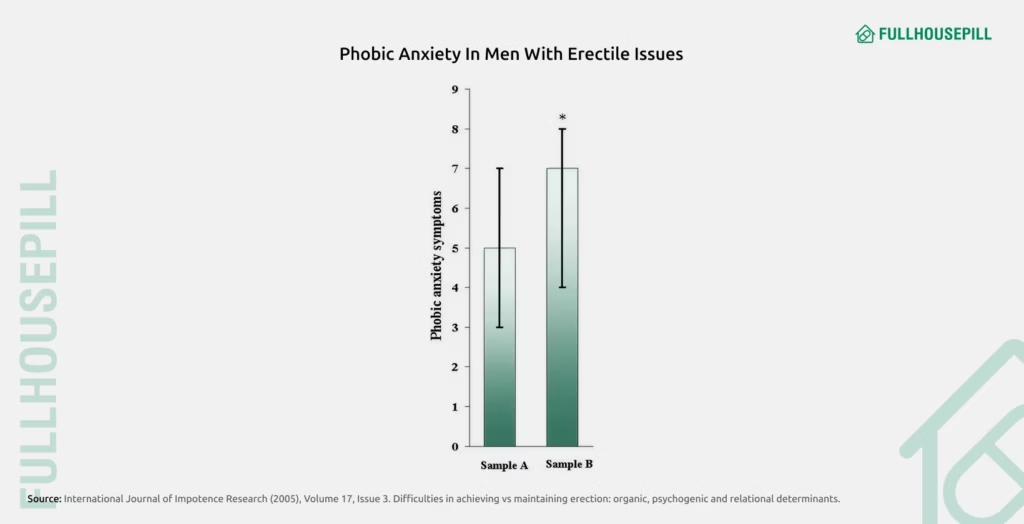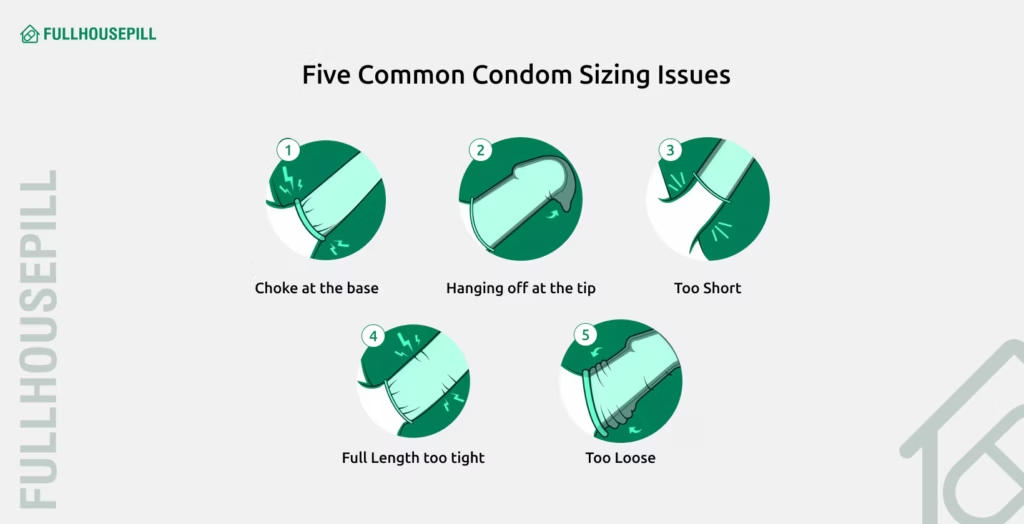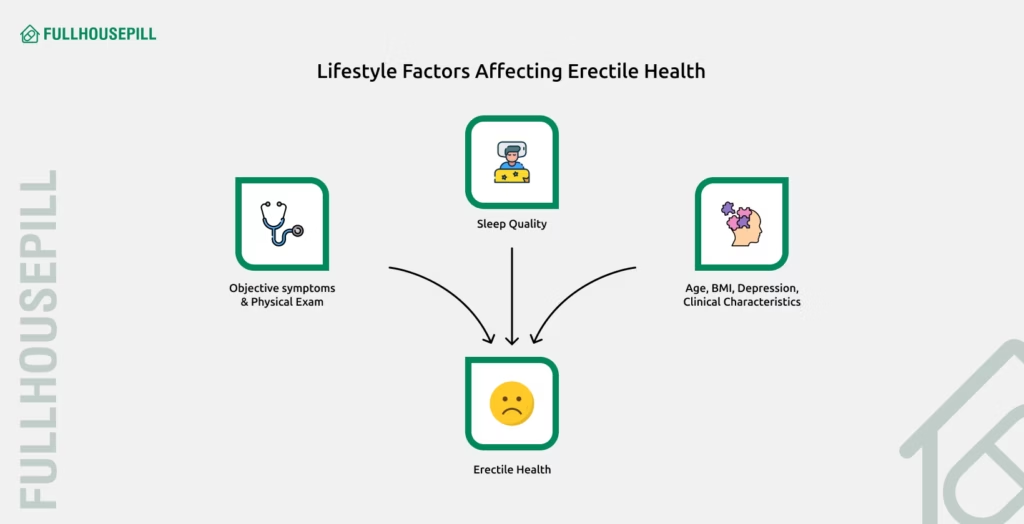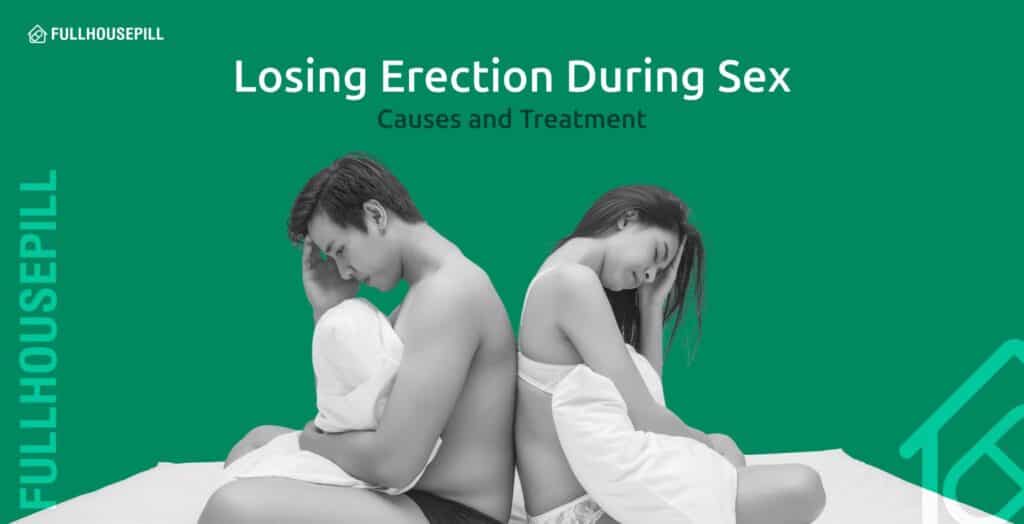Losing an erection during sex is a common concern that stems from a range of physical, psychological, and lifestyle-related factors. This issue not only affects sexual satisfaction but also indicates underlying health problems. Loss of erection during the excitement phase is a sign of possible vascular, hormonal, or neurological dysfunction, and may also point to performance anxiety or relationship stress. Treatments vary based on the root cause and include medication, lifestyle changes, and psychological interventions. Understanding the mechanism of an erection and what disrupts it is essential for finding effective solutions.
An erection is a complex physiological process involving the nervous, vascular, and hormonal systems. When a man becomes sexually aroused, signals from the brain stimulate the release of nitric oxide in the penile tissues, leading to the dilation of blood vessels and increased blood flow into the corpora cavernosa. This pressure traps blood in the penis, resulting in firmness and rigidity. The process is primarily parasympathetically driven and is highly sensitive to both mental and physical disruptions.
Physiologically, loss of erection could be due to reduced blood flow from cardiovascular disease, diabetes-related nerve damage, or low testosterone. Psychologically, stress, anxiety, or relationship conflict triggers sympathetic nervous system activity, causing vasoconstriction and loss of rigidity. A study in the Asian Journal of Psychiatry (2015) found that men with erectile dysfunction or premature ejaculation had significantly higher rates of anxiety and depression compared to controls. The findings suggest a strong link between psychological distress and sexual dysfunction, highlighting the need for mental health evaluation in ED cases.
Other common causes include vascular issues (eg. atherosclerosis), neurological disorders (eg. multiple sclerosis), hormonal imbalances (eg. low testosterone), side effects of medications, or lifestyle factors like smoking, alcohol, and poor sleep. Treatments depend on the diagnosis; options range from PDE5 inhibitors like sildenafil (Viagra) to testosterone therapy, cognitive-behavioral therapy (CBT), stress reduction techniques, and lifestyle changes. A report in the Current Sexual Health Reports (2014) recommended lifestyle alterations such as engaging in regular physical activity, quitting smoking, adopting a Mediterranean-style diet, and limiting alcohol intake to moderate levels.
Understanding the causes of erectile loss is essential. The following sections outline key factors behind losing an erection during sex, supported by current research.
What Is Losing Erection?
Losing an erection, medically known as detumescence, refers to the physiological process in which the penis returns from an erect to a flaccid state. This occurs when the inflow of arterial blood into the penile corpora cavernosa decreases, and the venous outflow increases, allowing the trapped blood to exit. Neurological signals, hormonal changes (notably a drop in nitric oxide and cyclic GMP levels), and psychological factors all influence this process. While detumescence is a normal part of the sexual response cycle, frequent or premature loss of erection during sexual activity may indicate erectile dysfunction (ED), a common sexual health condition in men.
What Causes a Man To Lose His Erection?
Losing an erection occurs when the physiological mechanisms that support penile rigidity are disrupted. An erection is primarily maintained by increased blood flow into the corpus cavernosum and restricted venous outflow, mediated by neural, vascular, hormonal, and psychological factors. When any component of this system is impaired, the balance shifts, leading to a reduction in blood inflow or an increase in outflow, and the erection subsides.
This loss may be situational (e.g., due to anxiety or stress during a specific encounter) or persistent (as seen in erectile dysfunction). Contributing causes may include psychological disturbances, vascular or neurological impairments, hormonal imbalances, medication side effects, or lifestyle-related factors. The process is governed by a drop in nitric oxide signaling and cyclic GMP levels, which reduces smooth muscle relaxation and penile blood retention, ultimately leading to detumescence.
Several underlying factors contribute to this process. These may range from psychological to physiological causes, as outlined below.
During Penetration
Losing an erection during penetration is a common issue and often stems from a combination of performance anxiety, psychological distraction, and physical sensitivity changes. During the transition from foreplay to penetration, some men become overly focused on performance or the fear of not satisfying their partner. This mental pressure triggers the sympathetic nervous system, leading to stress-related release of adrenaline, which constricts blood vessels and reduces penile blood flow, causing the erection to weaken or disappear.
Additionally, men who engage in frequent or intense masturbation, especially with pornography, may experience desensitization to real-life sexual stimuli, making penetration less arousing. This phenomenon is often linked to Porn-Induced Erectile Dysfunction (PIED).
A study published in the International Journal of Impotence Research (2005) found that men who lose their erection during penetration (i.e., have difficulty maintaining an erection) are less likely to have underlying organic causes. Instead, their issues are more often tied to psychological or relational factors.
The shift in focus from pleasure to performance often activates a stress response that undermines the physiological mechanisms required to maintain a strong erection.

With a New Partner
Losing an erection with a new partner is a common and usually temporary experience, often referred to as “honeymoon impotence” or situational erectile dysfunction. This occurs when a man achieves or maintains erections in other situations, like during masturbation or with a regular partner, but experiences difficulty during initial sexual encounters with someone new. The novelty, unfamiliarity, and pressure to perform all trigger a stress response that interferes with arousal and erection maintenance.
A study in the Journal of Sex & Marital Therapy (2009) found a clear link between sex with a new or unfamiliar partner and a higher likelihood of erectile dysfunction during first intercourse. Men who had sex with someone they didn’t know well reported more negative emotions such as anxiety, stress, and discomfort, factors that significantly increased the risk of erection problems. This suggests that unfamiliarity with a partner heightens performance pressure and emotional distress, leading to sexual difficulties.
This type of erection loss is usually short-term and situational, resolving on its own as comfort and familiarity grow between partners. Understanding that this reaction is normal and supported by evidence reduces anxiety and prevents it from becoming a recurring issue.
After Putting on a Condom
Putting on a condom sometimes disrupts the delicate balance of arousal and blood flow needed to maintain an erection, a phenomenon known as condom-associated erection problems (CAEP). Research published in Sexual Health (2015) shows that 37% of sexually active young men experience erection loss either during application or while having sex with a condom, due to issues like reduced sensation, distraction during application, and poor condom fit. Many men reported erection loss either during or shortly after condom use, leading some to remove the condom or avoid using one altogether. These reactions often increased the risk of unprotected sex. The findings highlight how CAEP impacts both sexual performance and safe sex practices.

Key contributing factors include poor condom fit, decreased penile sensation, and interruptions in sexual flow. For example, a tighter-than-optimal condom physically constricts the penis, reducing blood flow and prompting loss of an erection. Erection loss after putting on a condom is often caused by mechanical and sensory disruptions, not organic impotence. Choosing a condom that fits well, staying aroused during application, and integrating condom use smoothly into intimacy significantly reduces the likelihood of CAEP.
Midway Through Sex
Losing an erection midway through sex often stems from a sudden shift in the body’s physiological state. This is triggered by factors such as mental distraction, vascular changes, or physical fatigue. Even brief interruptions or changes in focus, like adjusting to a new position, minor discomfort, or wandering thoughts, activates the sympathetic nervous system. This response causes blood vessels to constrict and disrupt the steady blood flow needed to maintain penile rigidity.
A study in the American Journal of Men’s Health (2014) found that psychological stressors like distraction, low self-confidence, and anxiety during intercourse increase the risk of erection loss mid-act. Even small interruptions, like changing positions or sensing disinterest from a partner, shifts the brain’s attention away from arousal, leading to detumescence. A meta-analysis in Neuroscience & Biobehavioral Reviews (2012) reviewed neuroimaging studies on sexual arousal and orgasm in healthy men and women. It found that sexual arousal activates both emotional (limbic) regions and cognitive control areas like the prefrontal cortex. The balance between these systems influences the intensity and regulation of sexual responses. Losing an erection midway through sex often results from a temporary imbalance between sexual excitation and inhibition, whether triggered by mood, environment, or subtle physical changes.
Before Insertion/Climax
Losing an erection just before insertion or climax is often driven by psychological factors like performance anxiety, excessive self-monitoring, or fear of premature ejaculation. At this critical moment, a man may become hyper-aware of his performance or worry about satisfying his partner, thoughts that activate the sympathetic nervous system. This interferes with getting or keeping an erection by causing blood to be pulled away from the genital area and toward other parts of the body.
The findings of a study published in The Canadian Journal of Human Sexuality (2022) show that anxiety triggered by fear-conditioning inhibits sexual arousal in real time, supporting the role of anticipatory stress in erection difficulties before or during sexual activity. Another study in Behaviour Research and Therapy (1986) found that when sexually functional men were exposed to the threat of electric shock, a simulation of performance pressure, their erections weakened during sexual stimulation. This anxiety-induced decline was most evident during the early arousal phase, closely resembling erection loss right before penetration in real-life situations. The findings support the idea that anticipatory anxiety and performance pressure physiologically impairs erection maintenance at critical sexual moments.
Erection loss before penetration or climax typically stems from psychologically induced sympathetic activation and mental distraction, rather than physical impairment. When intrusive thoughts or fears take over, they undermine the automatic arousal system, even when physiological capability is intact.
Medical Conditions
Several chronic medical conditions are strongly associated with erectile dysfunction (ED), primarily due to their impact on blood flow, nerve signaling, and hormone regulation. Cardiovascular disease is a leading contributor, as it damages the vascular endothelium and impairs nitric oxide-mediated vasodilation, which is necessary for erection. A review in the Arab Journal of Urology (2013) emphasizes that erectile dysfunction (ED) is closely linked to cardiovascular disease, often sharing underlying causes like atherosclerosis and endothelial dysfunction. Because the penile arteries are smaller than coronary arteries, ED appears years before cardiac symptoms, making it an early warning sign for heart disease.
Other chronic illnesses like diabetes, chronic kidney disease, and neurological disorders also contribute to ED. A study in Diabetes Care (2009) reports that 75% of men with diabetes experience erectile dysfunction (ED), with diabetic men developing ED earlier than non-diabetics. Prolonged high blood sugar levels harm both blood vessels and nerves, resulting in decreased nitric oxide production, reduced blood flow, and trouble sustaining erections, making erectile dysfunction (ED) a frequent and more severe complication of diabetes. According to a study in the World Journal of Nephrology (2015), sexual dysfunction and chronic kidney disease (CKD) share common pathophysiological mechanisms and risk factors. ED is significantly more common in individuals with CKD, with its prevalence increasing alongside age and the progression of renal decline.
Medications Side-Effects
Many commonly prescribed medications are known to cause loss of erections as a side effect by interfering with the vascular, neurological, or hormonal systems involved in sexual arousal. A study in the Annals of Pharmacotherapy (2002) provides a comprehensive review of drug-induced sexual dysfunction, focusing on how common medications, like SSRIs, beta-blockers, and antipsychotics, impairs sexual desire, erection, and orgasm. Antidepressants, particularly selective serotonin reuptake inhibitors (SSRIs) such as fluoxetine, paroxetine, and sertraline, are among the most frequently implicated. These drugs increase serotonin levels, which dampens libido and inhibits sexual function. Beta-blockers, thiazide diuretics, and some antipsychotics interfere with erectile function by lowering blood pressure or altering neurotransmitter balance.
Additionally, in the World Journal of Men’s Health (2018), 5-alpha-reductase inhibitors like finasteride (used for hair loss and enlarged prostate) have been linked to persistent loss of erectile function in a subset of men, even after stopping the drug. These findings emphasize the importance of reviewing a patient’s medication history when evaluating erectile problems.
Lifestyle Factors
Unhealthy lifestyle habits are a major contributor to frequent erectile issues, often through their long-term effects on vascular, hormonal, and neurological health. Smoking, excessive alcohol use, poor diet, and physical inactivity are all linked to endothelial dysfunction and reduced nitric oxide availability, which are critical for achieving and maintaining an erection. A study in The Journal of the American Medical Association (2004) found that obese men with erectile dysfunction who underwent lifestyle changes, including weight loss and increased physical activity, showed improvement in erectile function. After two years, one-third of men in the intervention group regained normal erectile function, while no significant changes were seen in the control group. The improvements were linked to reductions in body weight, inflammation, and insulin resistance.

Sleep quality and stress management also play a critical role. Chronic sleep deprivation and high stress levels are associated with dysregulated cortisol and testosterone levels, both of which negatively impact libido and erectile strength. As per a study in Translational Andrology and Urology (2020) conditions like obstructive sleep apnea and insomnia are strongly associated with an increased risk of erectile dysfunction in men. Men with nightly oxygen drops during sleep (nocturnal hypoxemia) are about 1.4 times more likely to experience moderate to severe ED . Treating underlying sleep disorders, particularly with continuous positive airway pressure (CPAP) in sleep apnea patients, improves erectile function and sexual satisfaction. Lifestyle modifications like improved diet, regular exercise, quitting smoking, limiting alcohol, and managing stress, are consistently shown to enhance erectile function in men.
Low Testosterone
Low testosterone (hypogonadism) is a well-established cause of erectile dysfunction, particularly when levels fall below the physiological threshold required to support normal sexual function. Testosterone plays a critical role in regulating libido, maintaining nitric oxide synthase activity in penile tissue, and supporting the physiological processes that lead to erection. These effects are typically more pronounced in aging men, but younger individuals with endocrine disorders or lifestyle-induced hormonal imbalances may also be affected.
A study in World Journal of Men’s Health (2013) reviewed testosterone deficiency and found that low serum testosterone is linked to decreased libido and erectile dysfunction, particularly impairing nocturnal erections and overall erectile quality. It also highlighted that testosterone replacement therapy in hypogonadal men effectively improves sexual desire and erectile function, while emphasizing the connection between low testosterone, metabolic syndrome, and increased cardiovascular risk.
Testosterone deficiency also indirectly impairs erectile function through its effects on mood, energy, and overall well-being. Men with hypogonadism frequently experience fatigue, depression, and reduced confidence, which contribute to performance anxiety and psychogenic ED. A meta-analysis in International Journal of Impotence Research (2017) found that testosterone therapy improves erectile function as well as other aspects of sexual health in men with low testosterone. However, it is only effective when erectile issues are linked to low testosterone levels, and proper hormonal evaluation is essential before initiating treatment.
Performance Anxiety
Performance anxiety is a common psychological cause of erectile dysfunction, particularly in younger men or those without underlying medical conditions. It stems from fear of sexual failure, self-doubt, or pressure to meet perceived expectations during intercourse. This mental stress activates the sympathetic nervous system, which constricts blood vessels and inhibits the parasympathetic processes necessary for achieving and sustaining an erection.

A systematic review in the International Journal of Impotence Research (2021) found that men with anxiety disorders have a higher prevalence and severity of erectile dysfunction compared to men without such disorders, underscoring the negative impact of anxiety on sexual function. The study reported that generalized anxiety, panic disorder, and PTSD were most strongly associated with ED symptoms.
This anxiety often leads to a vicious cycle, where one failed sexual encounter causes further anxiety in future situations, exacerbating the problem. Cognitive distortions and hyper-focus on erection quality or partner satisfaction further impairs arousal. A study in The Journal of Sexual Medicine (2013) introduced the Erectile Performance Anxiety Index (EPAI), a validated 10-item self-report scale designed to reliably measure anxiety specific to erectile performance . The EPAI showed strong reliability, meaning it consistently measured what it was designed to. It captured most of the anxiety related to erectile performance, making it a useful tool for clinical assessment.
Addressing underlying psychological factors through therapy, mindfulness, or sex therapy often resolves ED when anxiety is the primary driver.
How To Not Think About Losing Erection?
To stop fixating on the fear of losing an erection, it’s essential to shift focus away from performance and toward the experience of intimacy itself. This involves retraining the mind through techniques like mindfulness and cognitive behavioral strategies that challenge negative thought patterns. Building sexual confidence through open communication with your partner, gradual exposure to sexual situations without pressure, and staying present in the moment reduces performance anxiety. In some cases, professional therapy, like sex therapy or guided CBT, may be necessary to break the cycle of anticipatory worry. The key is not to suppress the thought, but to redirect your attention and retrain your response to it.
How To Stop Losing an Erection and Stay Hard During Sex?
Achieving a stronger erection depends on enhancing blood flow, maintaining hormone balance, and reducing psychological stress. The following four evidence-backed strategies are the most effective for naturally improving erection strength and sexual performance:
- Eat Nitrate- and Zinc-Rich Foods
Consume leafy greens, beets, and oysters to increase nitric oxide levels and support testosterone production, both vital for firm erections. - Perform Kegels and Cardio
Pelvic floor exercises like Kegels improve blood retention in the penis, while aerobic workouts enhance overall vascular health. - Use Physical and Mental Arousal Triggers
Stimulate erogenous zones and engage in emotional intimacy or fantasies to boost nitric oxide release and neurological arousal. - Practice Breathing and Stress Relief
Use deep breathing and mindfulness to lower cortisol and activate the parasympathetic system, which helps sustain erections.
What Are the Medications That Help With Erection?
The most commonly prescribed medications for improving erections are PDE5 inhibitors, including sildenafil (Viagra) and tadalafil (Cialis). These ED medicines work by enhancing the effects of nitric oxide, a natural chemical in the body that relaxes the smooth muscles in the penis and increases blood flow during sexual stimulation. By supporting stronger and longer-lasting erections, ED medicine helps men with erectile dysfunction achieve and maintain an erection firm enough for sexual activity. These medications are effective for many men and are usually taken on demand or as prescribed by a healthcare provider. A healthcare provider determines the right ED medicine, dosage, and timing based on your health status, lifestyle, and any underlying conditions.
What Is The Effect Of Sildenafil On Weak Erection?
Sildenafil (Viagra) improves weak erections by enhancing penile blood flow during sexual stimulation. It belongs to the phosphodiesterase-5 (PDE5) inhibitor class, which works by increasing the availability of nitric oxide, a chemical that relaxes blood vessels in the penis. This relaxation allows more blood to enter the erectile tissue, helping to initiate and maintain a firm erection in men with erectile dysfunction (ED). The effects of a sildenafil citrate tablet typically begin within 30 to 60 minutes and last up to 4 hours. It does not cause an automatic erection but improves responsiveness to sexual arousal. For men experiencing weak or inconsistent erections due to blood flow problems, sildenafil is one of the most widely prescribed and clinically validated treatment options.
Does Losing Erection Mean I Have ED?
Losing an erection from time to time, especially during periods of stress, tiredness, or distraction, is normal and doesn’t automatically mean you have erectile dysfunction (ED). ED is typically diagnosed when the difficulty in achieving or maintaining an erection is persistent, occurs during most sexual encounters, and causes distress or interpersonal issues. An occasional loss of erection is often situational and reversible, whereas ED is a consistent, ongoing condition that may require medical evaluation and treatment.
Is Losing Your Erection Normal Sometimes?
Yes, losing your erection occasionally is completely normal. Erection quality fluctuates due to factors like stress, fatigue, distraction, emotional state, or even recent alcohol consumption. Temporary loss of an erection does not necessarily indicate a medical problem or sexual dysfunction. It becomes a concern only when it happens frequently, causes distress, or interferes with satisfying sexual activity.
Can Porn Cause Erectile Dysfunction?
Yes, pornography can cause erectile dysfunction by affecting psychological arousal and real-life sexual performance. Excessive porn use may lead to desensitization, making real intimacy less stimulating. It can also trigger performance anxiety and create unrealistic sexual expectations. Over time, the brain’s reward system adapts to porn-based stimulation, reducing responsiveness to real partners. This condition, known as Porn-Induced Erectile Dysfunction (PIED), is increasingly recognized in clinical studies and mental health reports.
What Are The Other Treatments For Losing Erection?
Other treatments for losing erection include lifestyle changes, therapy, medications, and mechanical aids. These options help address both the physical and psychological causes of erectile dysfunction (ED), especially when it involves maintaining an erection.
Lifestyle changes, such as quitting smoking, exercising regularly, eating a heart-healthy diet, and reducing alcohol consumption, can improve vascular health. Psychological counseling helps manage stress, anxiety, or performance pressure that may cause sudden erection loss. Cognitive-behavioral therapy and sex therapy are effective methods. Medications such as sildenafil, tadalafil, vardenafil, or avanafil improve blood flow and help maintain erections during sexual activity. For men who don’t respond to pills, penile injections, vacuum erection devices, or penile implants may be used. If you’re frequently losing your erection, a healthcare provider can determine the underlying cause and recommend the most suitable treatment.
